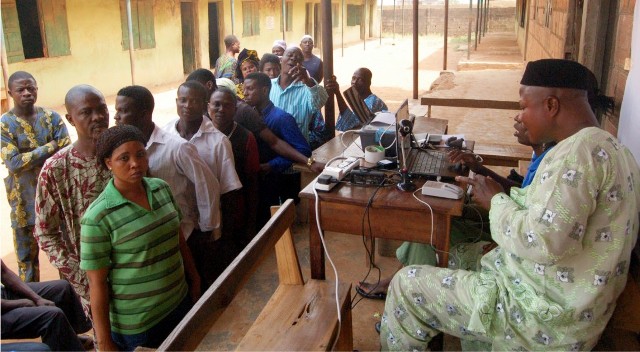Editorial
Ensuring Successful Voter Registration

The Independent National Electoral Commission (INEC) will, on April 27, 2017, commence a nationwide continuous Voter Registration exercise in the country. The exercise, according to the Chairman of the nation’s electoral umpire, Prof. Mahmood Yakubu, is in preparation for the 2019 general elections.
Affirming the resolve of the commission to commence the exercise, Prof. Yakubu assured that arrangements were on to ensure a smooth take-off of the exercise throughout the 774 local government areas of the country.
While The Tide commends the INEC for making early preparations towards successful conduct of the 2019 general elections, we urge eligible voters who are yet to register with the electoral body to make good use of the opportunity offered by the exercise.
It is also on this premise we welcome the early mobilisation initiative of the Governor of Rivers State, Chief Nyesom Wike who, at a meeting with Ikwerre traditional rulers led by Eze Blessing Wajor, charged monarchs to begin mobilisation of their subjects for effective participation in the forthcoming continuous voter registration exercise.
We think that the passive response in the past from individuals and organizations with responsibility for the electoral process which begins with the registration of voters, accounted for low turn-out of voters in previous elections across the country. This, we believe, also affected the quality of representation at all levels of government in the country.
The Tide believes that voter registration plays a key role in the promotion of democracy. Therefore, prompt attention must be given to the continuous voter registration to ensure that citizens are not denied their rights to determine who governs them.
We suggest that a nationwide sensitisation which should involve volunteers, civil groups, the mass media, non-governmental bodies, religious organisations, business community as well as educational institutions should be carried out to adequately sensitize and mobilise millions of eligible voters to register.
Election is essentially based on a number of parameters. One of them is the quality and credibility of voter registration which is central to election. It, therefore, behoves the INEC to use the opportunity offered by the forthcoming voter registration exercise in the country to tidy up its voters register. Dead persons should be properly identified and eliminated, while transfer of voting points should be handled properly.
The Tide, and indeed Nigerians, expect the INEC to go a step further to earn the confidence of the people by surmounting the nationwide complaints that trailed the 2014 registration/revalidation of voters register in which many Nigerians were denied registration. The first task before the commission is to ensure the registration of over 7.8 million Nigerians who were denied the franchise to participate in the 2015 general elections. Meanwhile, all citizens who have attained 18 years should be well captured in the forthcoming registration exercise.
We also expect the INEC to tackle the issues of constant breakdown of the Direct Data Capture Machine (DDCM), unavailability of adhoc staff, multiple registration and inability to locate the registration centres, among others. These challenges constitute a serious threat to the credibility of our electoral system and must be tackled head-on.
There is no gainsaying the fact that serious and genuine concerns have been raised about the integrity of the previous registration exercises. These concerns, we think, should jolt the INEC into ensuring a more credible voter registration exercise that would deepen the nation’s democracy.
Editorial
Beginning A New Dawn At RSNC

Editorial
Sustaining OBALGA’s Ban On Street Trading

Editorial
AFCON ’25: Bravo, Super Eagles, But…

-

 Sports4 days ago
Sports4 days ago2026 WC: Nigeria, DR Congo Awaits FIFA Verdict Today
-
Politics4 days ago
ADC, PDP, LP Missing As INEC Set For By- Elections In Rivers
-

 Environment4 days ago
Environment4 days agoOxfam, partners celebrate 5 years of climate governance programmes in Nigeria
-
Politics4 days ago
FG’s Economic Policies Not Working – APC Chieftain
-

 Politics4 days ago
Politics4 days ago2027: Diri Unveils RHA LG Coordinators, APC Congress Panel
-

 Politics4 days ago
Politics4 days agoReps To Meet,’Morrow Over INEC’s 2027 Election Timetable
-

 News3 days ago
News3 days agoVictory Over Insurgency Certain, Tinubu Assures
-

 Politics4 days ago
Politics4 days agoGroup Continues Push For Real Time Election Results Transmission

